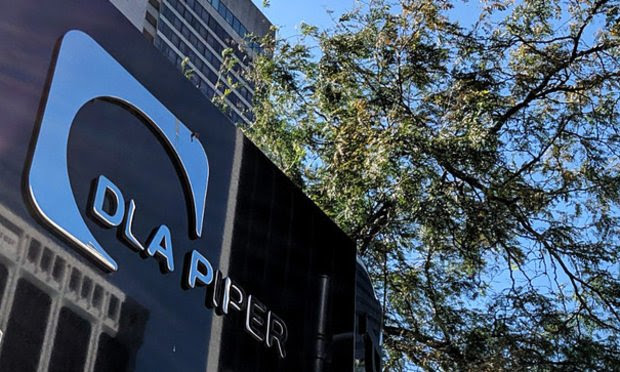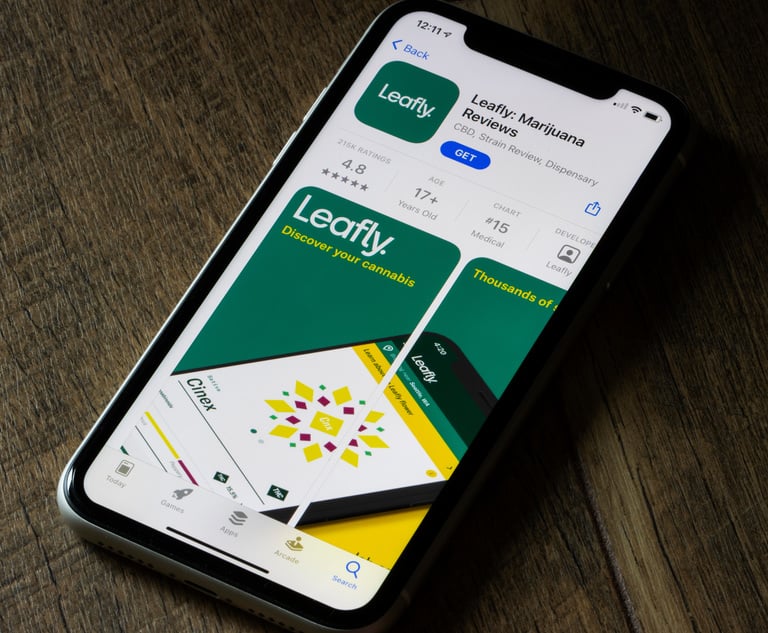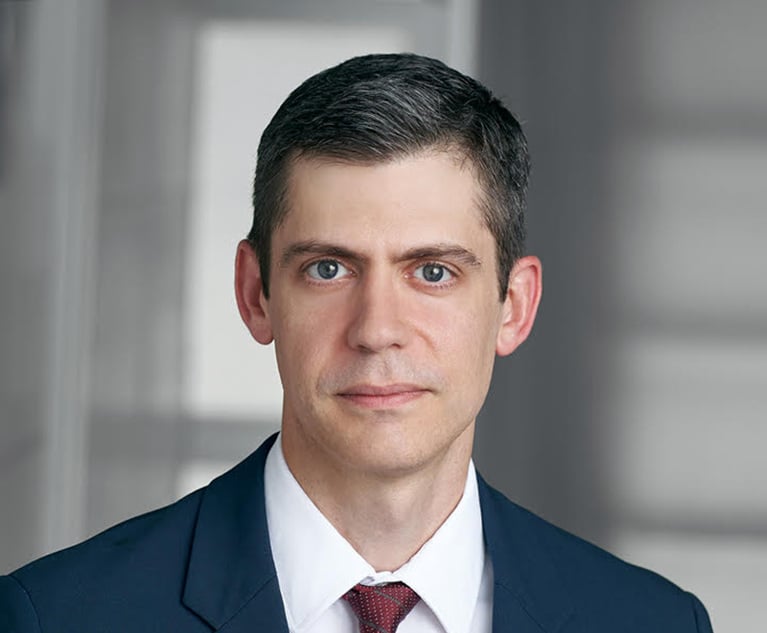Higher Law: Evolution of a Practice: Perkins Coie Cannabis Chair Q&A | New FinCEN Guidance | DOJ Leaders Counter Whistleblower Claims | Who Got the Work
Welcome to Higher Law. Perkins Coie's cannabis leader talks with us this week about building a practice and keeping up with fast-moving changes. Scroll down for the latest FinCEN guidance, and Who Got the Work. Have a happy and safe holiday—and thanks for reading!
July 02, 2020 at 04:00 PM
11 minute read
Welcome back to Higher Law, our weekly briefing on all things cannabis. I'm Cheryl Miller, reporting for Law.com from Sacramento. Have a safe and socially distanced Fourth of July.
This week we're looking at: Perkins Coie's cannabis practice chair, Barak Cohen, talks about building a practice and keeping on top of the industry • Fox Rothschild's work on a breach-of-contract suit targeting Sound Wellness • Pushback on a whistleblower's claim that the DOJ meddled with cannabis mergers
Higher Law will be on hiatus next week but we'll be back on July 16. So please send your story ideas and holiday tales to [email protected]. You can call me, too, at 916.448.2935. Follow me on Twitter @capitalaccounts.

Perkins Coie's Cannabis Chair on Forming a Practice and Keeping Up With Fast-Changing Industry
Perkins Coie has approximately 120 lawyers involved in some aspect of its cannabis practice–one of the largest numbers I've ever heardI recently spoke with the firm's practice leader, Barak Cohen, a former captain in the U.S. Army, about the group's formation and the issues shaping work right now.
The interview is edited for length and clarity.
Higher Law: Tell me about the cannabis practice at Perkins Coie. How many lawyers are in it?
Cohen: The current status of the practice is what the firm identifies as an industry group, We're a cross-practice, cross-office network of lawyers who are geared toward coordinated marketing.
 What it means from an outsider's perspective is there's a very obvious outward-facing organization.of lawyers in the firm that can address clients' and potential clients' needs. We have 120-plus lawyers from any number of practices, everything from our political law group to our white-collar investigations work to intellectual property attorneys to bankruptcy attorneys and real estate attorneys. And they are in all our offices throughout the U.S.
What it means from an outsider's perspective is there's a very obvious outward-facing organization.of lawyers in the firm that can address clients' and potential clients' needs. We have 120-plus lawyers from any number of practices, everything from our political law group to our white-collar investigations work to intellectual property attorneys to bankruptcy attorneys and real estate attorneys. And they are in all our offices throughout the U.S.
How did the practice evolve?
People in the firm have been doing the work for roughly four years, and I know that because I was among the first people doing the work.The firm's recognition of the promise of the practice, as well as its acceptability from a marketing perspective, is really confirmed by the fact that we're now organizing in a formal way.
What is the range of the practice? Are there certain issues you focus on specifically?
It is comprehensive. With respect to practice areas it covers everything. We've done trademark work. We've done white collar investigations work. We've done real estate work. We've advised e-commerce platforms. We're involved throughout the complete range of the industry.
Also, when you're talking about cannabis you're not just talking about marijuana, which we deal with, but also things like CBD and hemp and other cannabinoids. We are comprehensive in that sense as well.
What about the decision to create a formal practice group? Was there any hesitation by the firm? Any concerns about how other clients might feel?
Yes, the firm was very sensitive to the idea of having a cannabis practice. Not every attorney is used to the cannabis industry or had dealt with the cannabis industry before, and I think there were some preconceived notions about the industry and the kind of clients in the industry.
I can tell you my personal story of how I got involved roughly four years ago. A big institutional client, a very large payment processor, was interested in handling payments from the cannabis industry and wanted to understand what the potential for government enforcement was. And then three or four months later, another big institutional client came to me and wanted some very similar analysis — What are the risks of getting involved in this industry?
And I had this epiphany that I had misunderstood or not paid sufficient attention to the cannabis industry, and that there was a real market for big, institutional clients and smaller clients looking to build, that wanted to be super compliant and understand a very, very complicated legal and regulatory area.
How do you decide which clients the firm will work with?
For the most part we treat them the same way we would any other client. The critical difference is primarily in the venture capital space and maybe the startup space. In dealing with product-handling clients, we're in the process of implementing an enhanced due diligence.
It's not enough to just know they're complying with local law, which, ultimately local compliance is a gateway for all the clients. Are they complying with local law–not federal law, local law–at least with respect to marijuana? And if we're dealing with startups and venture capital then we do a little bit of background checking as well.
What are the biggest issues on your plate right now? For now it's just letting people know we have an active, sophisticated practice and that we can help clients along a broad range of issues.
The other challenge I think that anybody involved with providing legal services to the industry faces is just staying abreast of everything. In the industry, clients look to attorneys like me for trusted guidance beyond just what they specifically hired me to do. I may be hired to do due diligence for private equity. I might be hired to handle an internal investigation for a dispensary. But ultimately what they really want is a trusted advisor to protect their business interests and explain the larger swirl of legal and regulatory current events.
SPONSORED BY ALM PARTNERS
5 Tips for Avoiding Procrastination
This guide gives 5 tips for avoiding procrastination that can help you break out of paralysis and start producing at your peak. The fact of the matter is that we all procrastinate whether it's on something simple like vacuuming your living room or something big like preparing for a work presentation- we've all been there. With that procrastination can come stress as well as pressure. READ MORE

FinCEN Guidance on Hemp Industry Banking
The U.S. Treasury's Financial Crimes Enforcement Network, aka FinCEN, issued clarifying guidance this week for banks serving hemp-related businesses. The bottom line: banks should confirm a hemp grower's compliance with licensing requirements, but they're not required to file suspicious activity reports solely because clients work with the legal crop.
FinCEN warned that those reports would be necessary, however, if the customer is growing hemp in a jurisdiction where it isn't legal, if he or she appears to be using hemp as a front for marijuana operations, or if he or she isn't cultivating hemp in compliance with the law.
"To the extent the financial transactions of a hemp-related business are commingled with marijuana-related activities, a financial institution should apply FinCEN's 2014 Marijuana Guidance, which provides clarity on how to file SARs on marijuana-related activities," the guidance says.
>> From a Holland & Knight alert: "For many banks that are skittish about wading into the weeds of marijuana banking, hemp banking provides a potential trial run into an industry that requires comparable compliance protocols. In fact, many banks establishing hemp banking risk tolerances, policies and procedures are also laying the framework for an eventual marijuana banking program."
>> From a Morrison & Foerster advisory: "The Guidance is intended to improve access to financial services for hemp-related businesses, but FinCEN stresses that financial institutions must understand the nature and purpose of a customer relationship to recognize, monitor, and mitigate the related risks."

Who Got the Work
>> Cassels Brock & Blackwell and Paul Hastings acted as legal counsel to Canopy Growth in amending its agreement to merge with Acreage Holdings Inc. DLA Piper Canada and Cozen O'Connor acted as legal counsel to Acreage. The Motley Fool reports the renegotiated terms cut the value of the deal from its originally estimated $3.4 billion to $843 million.
>> Attorneys at Fox Rothschild removed a breach-of-contract lawsuit against Sound Wellness from the Court of Common Pleas of Allegheny County to the U.S. District Court for Western Pennsylvania. The complaint was filed by Bernstein-Burkley on behalf of Thar Process, a hemp processor. Sound Wellness is a subsidiary of CBD producer Jushi Holdings Inc.
>> Las Vegas-based CBD extraction company GVB Biopharma has retained the Smith-Free Group to lobby federal lawmakers, according to a recent filing. GVB plans to lobby on issues related to the "import/export of CBD equipment" and will monitor regulations on hemp and CBD, the company said.

In the Weeds…
>> DOJ's pushing back against whistleblower testimony. ""The top antitrust official at the Justice Department has pushed back on eyebrow-raising testimony his former chief of staff delivered to Congress last week––and, in the process, alluded to how flummoxed department attorneys were with an unusually thorny legal issue: marijuana mergers. The pushback comes in a letter that Makan Delrahim (above), the head of the Justice Department's Antitrust Division, sent on Wednesday to the top Republican and Democrat on the House Judiciary Committee. In the letter, Delrahim said John Elias's testimony was 'misleading and lacks critical facts.'" [Politico]
>> Illinois is delaying new cannabis licenses. Governor J.B. Pritzker on Monday issued an executive order delaying Wednesday's scheduled issuance of 80 permits combined for craft growers and infusers and an undetermined number for transporters. Pritzker blamed the pandemic and a previous six-week application deadline extension for the delay. [Chicago Sun-Times]
>> Border patrol checkpoints are snagging state-legal growers outside San Diego. "Growers and distributors in Imperial County and other parts of Southern California often have to go through Border Patrol checkpoints en route to testing facilities or to bring them to markets farther west. Sometimes, they say, Border Patrol will let them through, checking their state license without problem. But other times, those agents confiscate products and cash." [Voice of San Diego]
>> Could federal legalization be worse for the cannabis industry than state control? It depends on the ensuing regulations and bureaucracy, Bob Hoban of Hoban Law Group writes. "Without clear leadership and simple, definitive policy surrounding federal legalization, hundreds of thousands of jobs could be lost, and millions of dollars in U.S. government funds could be wasted in uncoordinated and directionless bureaucratic agency action." [Forbes]
>> First it was the Dixie Chicks, now it's Dixie Brand. Like the singing trio, Denver-based cannabis edibles company Dixie Brand is dropping the "Dixie" name "due to the historical context of the word." Company leaders haven't picked a new moniker and are asking its customers for suggestions. [Westword]
>> The International Cannabis Bar Association has elected seven directors. And they're all women. Amy McDougal, Katy Young, Lauren Mendelsohn, Lauren Rudick, Meital Manzuri, Shabnam Malek and Shawn Hauser join the six existing members of the board. [INCBA]

Items for Our Calendars
July 7 - The deadline for submitting public comments on California's proposed regulations for comparable-to-organic cannabis standards is July 7.
July 9 - Harris Bricken hosts the webinar "Ketamine, Psilocybin and New Drug Therapies." The panel will be moderated by Hilary Bricken, with panelists Griffen Thorne, Vince Sliwoski , and Jesse Mondry.
July 13 - NJ Cannabis Insider, in collaboration with Advance 360, hosts the webinar "Cannabis Reform 2020: America's Growing Pains & Possibilities." Speakers include Congressman Jim McGovern of Massachusetts, Minorities for Medical Marijuana founder Roz McCarthy, and Karen O'Keefe, director of state policies for Marijuana Policy Project.
This content has been archived. It is available through our partners, LexisNexis® and Bloomberg Law.
To view this content, please continue to their sites.
Not a Lexis Subscriber?
Subscribe Now
Not a Bloomberg Law Subscriber?
Subscribe Now
NOT FOR REPRINT
© 2025 ALM Global, LLC, All Rights Reserved. Request academic re-use from www.copyright.com. All other uses, submit a request to [email protected]. For more information visit Asset & Logo Licensing.
You Might Like
View All
NY Cannabis Marketing Rulings / Rescheduling Effects / Honigman's Work on Trademark Suit / Goodbye
9 minute read
Workplace Weed and Labor Pacts / State AGs and Hemp / Maryland Licensing Suit / Vicente Sues Recruiter
9 minute readLaw Firms Mentioned
Trending Stories
- 1ACC CLO Survey Waves Warning Flags for Boards
- 2States Accuse Trump of Thwarting Court's Funding Restoration Order
- 3Microsoft Becomes Latest Tech Company to Face Claims of Stealing Marketing Commissions From Influencers
- 4Coral Gables Attorney Busted for Stalking Lawyer
- 5Trump's DOJ Delays Releasing Jan. 6 FBI Agents List Under Consent Order
Who Got The Work
J. Brugh Lower of Gibbons has entered an appearance for industrial equipment supplier Devco Corporation in a pending trademark infringement lawsuit. The suit, accusing the defendant of selling knock-off Graco products, was filed Dec. 18 in New Jersey District Court by Rivkin Radler on behalf of Graco Inc. and Graco Minnesota. The case, assigned to U.S. District Judge Zahid N. Quraishi, is 3:24-cv-11294, Graco Inc. et al v. Devco Corporation.
Who Got The Work
Rebecca Maller-Stein and Kent A. Yalowitz of Arnold & Porter Kaye Scholer have entered their appearances for Hanaco Venture Capital and its executives, Lior Prosor and David Frankel, in a pending securities lawsuit. The action, filed on Dec. 24 in New York Southern District Court by Zell, Aron & Co. on behalf of Goldeneye Advisors, accuses the defendants of negligently and fraudulently managing the plaintiff's $1 million investment. The case, assigned to U.S. District Judge Vernon S. Broderick, is 1:24-cv-09918, Goldeneye Advisors, LLC v. Hanaco Venture Capital, Ltd. et al.
Who Got The Work
Attorneys from A&O Shearman has stepped in as defense counsel for Toronto-Dominion Bank and other defendants in a pending securities class action. The suit, filed Dec. 11 in New York Southern District Court by Bleichmar Fonti & Auld, accuses the defendants of concealing the bank's 'pervasive' deficiencies in regards to its compliance with the Bank Secrecy Act and the quality of its anti-money laundering controls. The case, assigned to U.S. District Judge Arun Subramanian, is 1:24-cv-09445, Gonzalez v. The Toronto-Dominion Bank et al.
Who Got The Work
Crown Castle International, a Pennsylvania company providing shared communications infrastructure, has turned to Luke D. Wolf of Gordon Rees Scully Mansukhani to fend off a pending breach-of-contract lawsuit. The court action, filed Nov. 25 in Michigan Eastern District Court by Hooper Hathaway PC on behalf of The Town Residences LLC, accuses Crown Castle of failing to transfer approximately $30,000 in utility payments from T-Mobile in breach of a roof-top lease and assignment agreement. The case, assigned to U.S. District Judge Susan K. Declercq, is 2:24-cv-13131, The Town Residences LLC v. T-Mobile US, Inc. et al.
Who Got The Work
Wilfred P. Coronato and Daniel M. Schwartz of McCarter & English have stepped in as defense counsel to Electrolux Home Products Inc. in a pending product liability lawsuit. The court action, filed Nov. 26 in New York Eastern District Court by Poulos Lopiccolo PC and Nagel Rice LLP on behalf of David Stern, alleges that the defendant's refrigerators’ drawers and shelving repeatedly break and fall apart within months after purchase. The case, assigned to U.S. District Judge Joan M. Azrack, is 2:24-cv-08204, Stern v. Electrolux Home Products, Inc.
Featured Firms
Law Offices of Gary Martin Hays & Associates, P.C.
(470) 294-1674
Law Offices of Mark E. Salomone
(857) 444-6468
Smith & Hassler
(713) 739-1250










